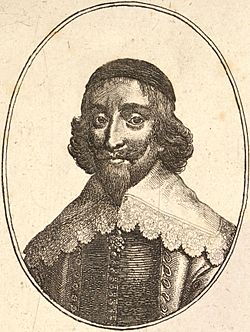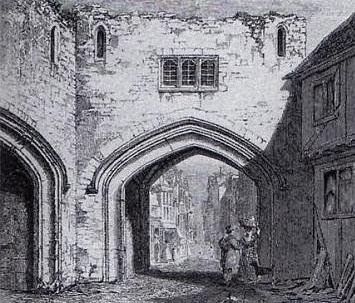John Bastwick facts for kids

John Bastwick (1593–1654) was an English doctor and writer. He lived during a time when England was facing big changes. Bastwick was known for speaking out against the government and the church. Because of his strong opinions, he faced harsh punishments, including having his ears removed. His wife, Susanna Bestwick, supported him greatly.
Contents
Early Life and Education
John Bastwick was born in 1593 in Writtle, Essex, England. He started studying at Emmanuel College, Cambridge, in 1614. However, he did not stay long and left without a degree.
After leaving Cambridge, he traveled and served as a soldier for a while. He likely joined the Dutch army. Later, he studied medicine in other countries. He earned his medical degree in Padua, Italy. In 1623, he returned to England and became a doctor in Colchester.
Speaking Out Against the Church
Bastwick was a skilled writer in Latin. He began his career by writing controversial books in Latin. In 1634, he published two books in the Netherlands. These books spoke against the Catholic Church. One book, Elenchus Religionis Papisticae, answered a Catholic writer. The other, Flagellum Pontificis, supported the idea of Presbyterianism. Presbyterianism was a different way of organizing the church.
These writings caught the attention of William Laud, a powerful church leader. Bastwick was brought before a special court called the Court of High Commission. He was found guilty of writing a "scandalous libel." This meant his writings were seen as harmful to the church. He was ordered to pay a large fine of £1,000. He was also sent to Gatehouse Prison near Westminster Abbey. He would stay there until he changed his mind.
In 1636, while still in prison, Bastwick wrote another book. This one was against the high commission court. It was called Πράξεις τῶν επισκόπων, sive Apologeticus ad Praesules Anglicanos.

Harsh Punishments
In 1637, Bastwick wrote a new book in English. It was called Letanie of Dr. John Bastwicke. In this book, he strongly criticized bishops. He called them enemies of God. A publisher named John Wharton asked him to write this book in English. The book was printed in the Netherlands.
Other people, like William Prynne and Henry Burton, also faced similar problems for their writings. Bastwick wrote a long defense for himself. This only made his situation worse.
He was found guilty again by another court called the Star Chamber. The court gave him a very harsh sentence. He was ordered to pay a huge fine of £5,000. He was also sentenced to life in prison. Most shockingly, he was to have his ears removed in the pillory. The pillory was a public wooden frame used for punishment.
This punishment was carried out in public. Many people came to watch. Bastwick even brought his own scalpel. His wife, Susanna, bravely kissed his ears before they were removed. After the painful event, she held his ears close to her.
Life After Prison
After his public punishment, Bastwick was moved to Star Castle, Isles of Scilly. But in November 1640, a new parliament, called the Long Parliament, ordered his release. In December, he returned to London like a hero. The parliament also ordered that he be paid back the fines he had to pay. This happened on March 2, 1641.
In 1642, the First English Civil War began. Bastwick became a captain in the Leicester local army, called the trained bands. On July 22, royalist soldiers captured him in Leicester. He was sent to prison in York.
Soon after, he was free again. In 1643, he published another declaration. It stated that anyone against the parliament, including church leaders, were enemies of God. By 1645, the war changed the relationship between different Protestant groups. These included Presbyterians, like Bastwick, and Independents, like the new Quakers and Congregationalists.
Bastwick and Prynne were strict Presbyterians. They wanted a strong Presbyterian church. However, other groups, like the Levellers led by John Lilburne, wanted more freedom. Bastwick and Colonel Edward King even had Lilburne arrested in 1645. This was because Lilburne had spoken against the Speaker of the House of Commons.
In 1648, Bastwick wrote two strong papers against the Independents. He also defended himself against Lilburne's criticisms.
His Later Years
John Bastwick died in 1654. Records show he was buried on October 6, 1654.
Family Life
John Bastwick married Susanna Poe. They had five children together. Their twin daughters, Judith and Dionise, were born in 1626. They had two sons, both named John, born in 1633 and 1646. Their last child, Susanna, was born in 1640.
See also
- English Dissenters
 | Selma Burke |
 | Pauline Powell Burns |
 | Frederick J. Brown |
 | Robert Blackburn |

